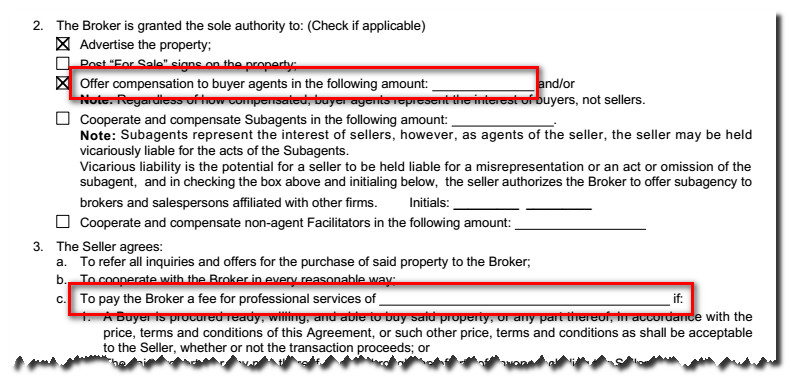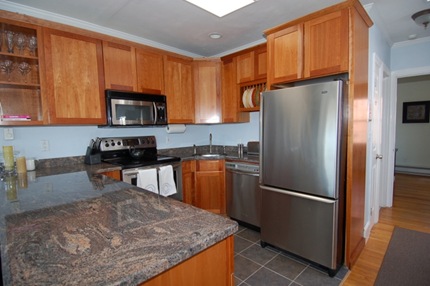As a seller, you control the total real estate agent commission to be paid when your home sells. It’s actually at the very front end of your sale, when you sign a listing agreement with an agent that you decide how much commission the listing agent is going to receive and how much commission the buyer’s agent will receive.
When a Realtor signs a listing agreement with you to sell your home, you’ll agree upon a number of items that form the basis for that listing agreement. That might include the listing price of your home, how long the listing agreement will be valid, and one of the biggest points of contention, how much commission the Realtor will charge you to list (and hopefully sell) your home.
When you agree upon the real estate agent commission to be charged, you’re actually agreeing on not just the total commission to be paid, but also, the split between the listing broker and the buyer’s agent, presumably the real estate agent that will bring a buyer to the table to purchase your home.
You’ll notice in a listing agreement, the one below is the official exclusive right to sell listing agreement furnished by the Greater Boston Real Estate Board (GBREB), that there’s first a clause that in essence calls for you as the seller to grant the listing broker the authority to offer compensation to a buyer’s agent, while there’s a second clause that dictates the total commission you will pay on the sale of your home.
Did you get that? When signing a listing agreement, you’re agreeing to pay a listing broker an overall real estate agent commission to sell your home, and as part of that, you’re also granting that listing broker the authority to offer compensation to a buyer’s agent.

Sellers Pay Buyer’s Agent Commission
Invariably, when you agree to provide a total real estate agent commission, let’s just say for example, of 5% when listing your home for sale, the listing agent will plug into the listing agreement 5% for the total commission, and 2.5% for the amount that you are granting them the authority to offer a buyer’s agent.
The listing agent will do a 50/50 split on the total commission nearly 100% of the time.
Why?
It’s simply common practice in the market, and it’s rarely ever challenged.
The listing agent actually incurs more expense to list your home for sale than a buyer’s agent would bringing a buyer to the table. Just think of some of the expenses that a listing agent might incur to list your home for sale as part of the marketing plan that they have for your property. That could include building a property specific website for your real estate listing, real estate staging, sending out postcards to the local neighborhood, hosting a broker’s open with food and refreshments, and creating and printing professionally designed real estate flyers for use during both open houses and private showings.
Clearly the listing agent incurs more cost than a buyer’s agent, why do both parties get the same commission?
Why and How to Lower Buyer’s Agent Commission
What if you were to ask your listing agent to tell you the most common buyer’s agent commission for your market. What if you were to ask your listing agent whether keeping their commission the same, but lowering the buyer’s agent commission would have any adverse effect, statistically speaking, on the sale of your home.
You can ask your Realtor those questions, however, they won’t know the answers, but by all means you can ask. The only true study of how much buyer’s agents get paid was conducted by Entry Only New England, it was a first of its kind study, and it revealed some exceptionally interesting facts about the nature of buyer’s agent commission rates in real estate transactions.
So, why not ask to lower the buyer’s agent commission when signing a listing agreement. You as the seller are in control of the percentages and/or amounts that get written into your listing agreement. What would an additional 0.5% mean to you?
The average list price of the most recent Boston condos to hit the market for sale over the past three days is $691,899. Just imagine if you were able to shave 0.5% of commission off your sale price – by keeping the listing agent’s commission at the level they proposed, but reducing the buyer’s agent commission that was originally proposed by 0.5%. That would equate to an additional $3,000 that would go into your pocket at the closing table!
The secret of buyer’s agent commission might just be that you as the seller are in control of buyer’s agent commission and that it’s reasonable to ask about decreasing that amount. Sellers oftentimes don’t know that they’re in control of buyer’s agent commission and you very well might be offering too much and could save yourself thousands of dollars in real estate commission by asserting control over the buyer’s agent commission percentage.







